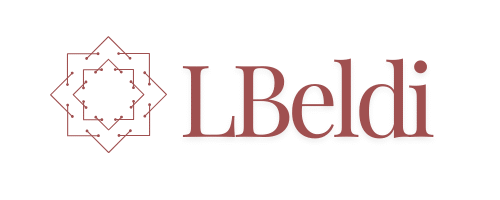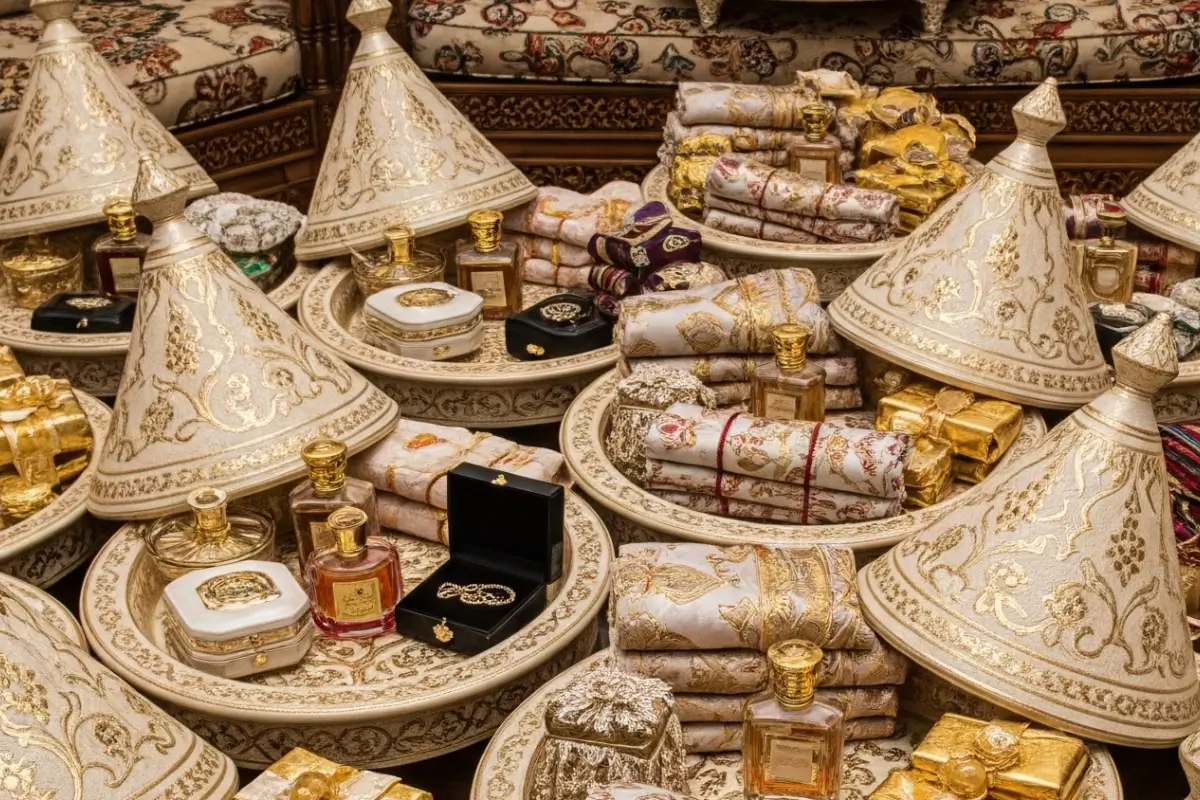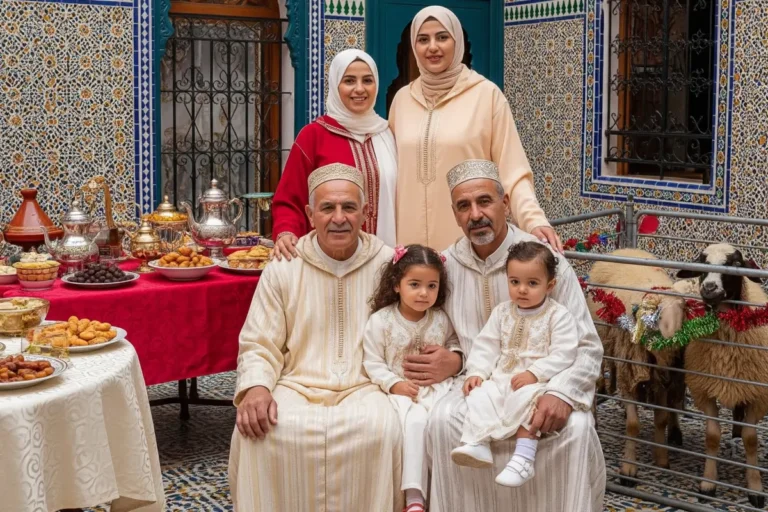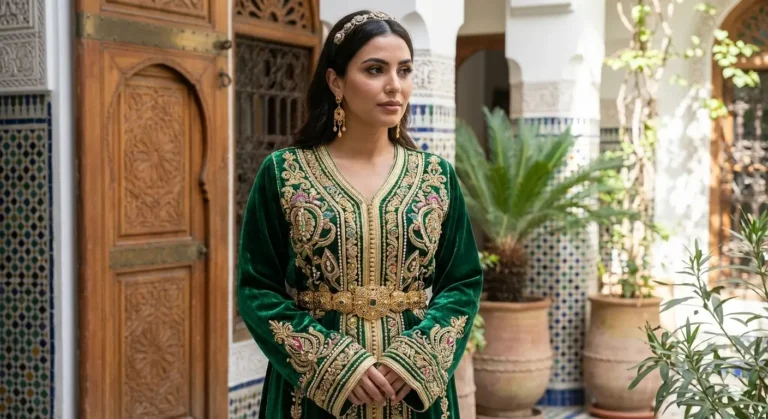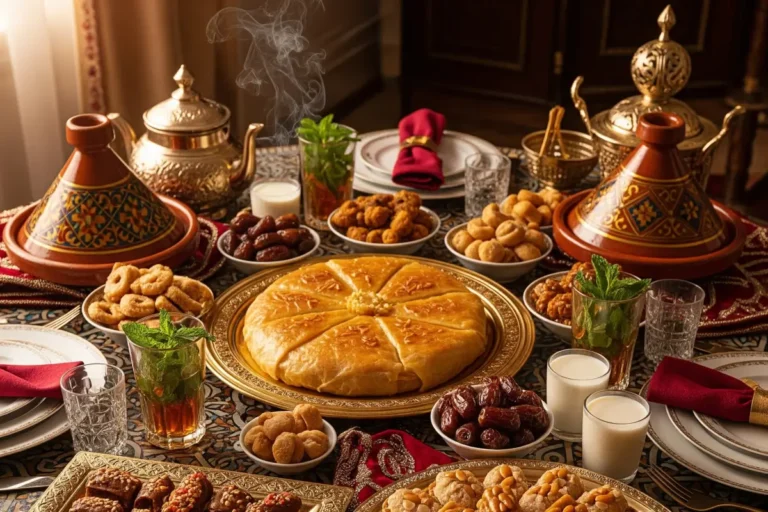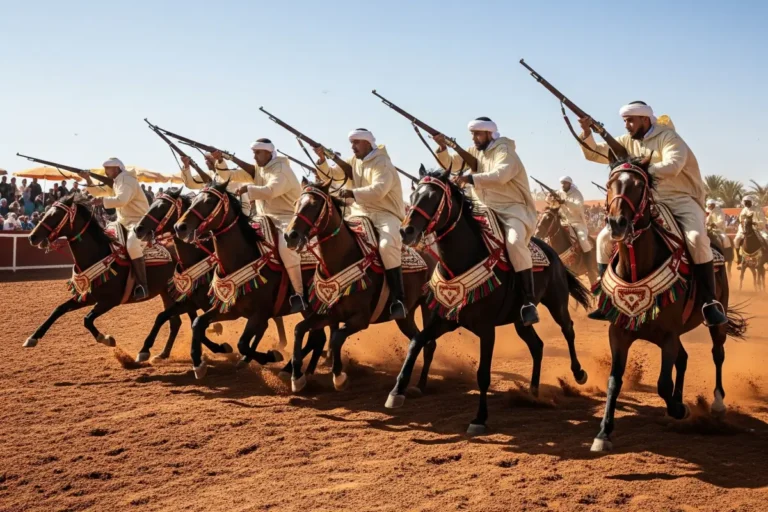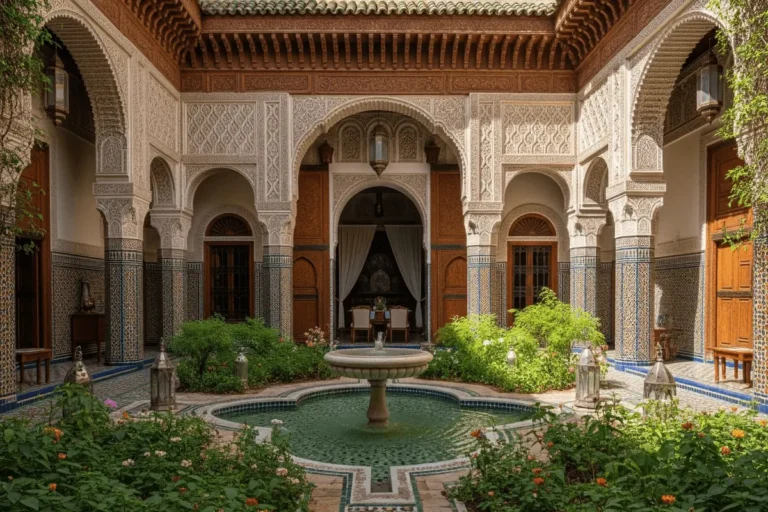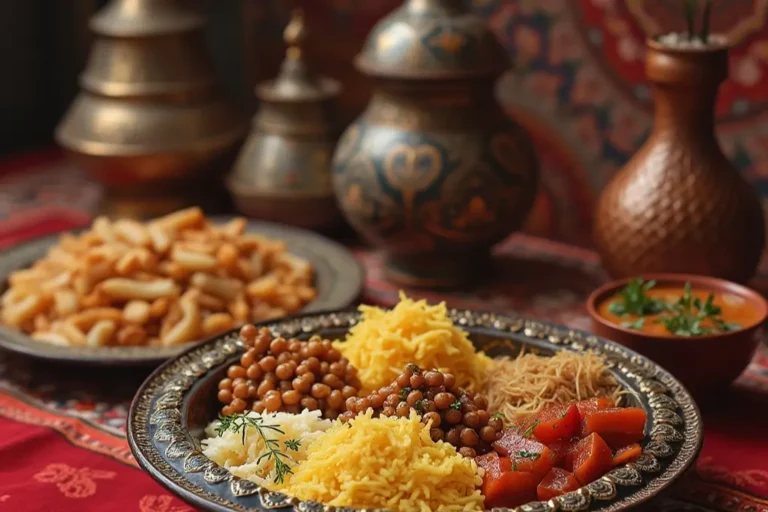Moroccan Wedding Gifts : Traditions, Ideas & Modern Touches
Table of Contents
Introduction
Moroccan weddings are a rich tapestry of ancient traditions, warm hospitality, and heartfelt celebrations. At the heart of these inherited customs, gift-giving plays a pivotal role, symbolizing love, blessings, and good wishes for the newlyweds. Whether you are invited to attend such a joyous event or simply wish to learn about Moroccan culture, understanding the traditions behind Moroccan wedding gifts will help you offer a token of appreciation rich in meaning and sentiment.
Let’s delve into the beauty of Moroccan wedding gifts, exploring the vibrant traditions, thoughtful ideas, and contemporary touches that make them so special.
Understanding Moroccan Wedding Gift Traditions
Moroccan weddings are deeply rooted in tradition. Every ceremony is carefully woven with cultural practices designed to unite not just two individuals, but two families. Here, gift-giving becomes much more than an obligation; it is a sincere expression of blessings and respect.
The Cultural Significance of Gift-Giving
In Moroccan culture, gifts are a way to show genuine affection and good wishes for the couple embarking on their new journey. Each gift is chosen with great care, reflecting symbolic meanings such as prosperity, fertility, or a sweet future.
Gift-giving highlights the importance of community and family, which are central to Moroccan values. Thoughtful tokens convey far more than monetary value; they represent the giver’s careful consideration of the couple’s traditions, preferences, and connection to their heritage.
Key Moments for Gift-Giving During Moroccan Weddings
Moroccan weddings span several days, with multiple events where gifts are traditionally presented:
•Engagement Ceremony (Khetba): Families exchange symbolic gifts, setting the stage for the union.
•Henna Night (Dfou’ or Dhaz): Guests offer thoughtful gifts, such as sweets or pastries, symbolizing joy and celebration. This night holds special significance, as the groom’s gifts to the bride are presented in a celebratory procession known as “Dfou'” or “Dhaz.”
•Wedding Day: This grand finale often calls for distinctive gifts that reflect the couple’s cultural heritage and future prosperity.

By Adil Chaouki – https://www.flickr.com/photos/maidil/8392907680/, CC0, Link
For example, in a survey of Moroccan brides, over 80% reported that symbolic and traditional gifts were far more memorable than monetary equivalents. This further emphasizes the great importance of meaningful offerings.
Dfou’ and Dhaz: Gift Rituals in Moroccan Weddings
“Dfou'” or “Dhaz” is one of the most prominent rituals in Moroccan weddings, a celebratory procession in which the groom and his family carry gifts to the bride on Henna Night. The name of this tradition varies from one region to another in Morocco; in some areas, it is known as “Al-Battat” or “Al-Shawar.”
Traditional Dfou’ Components
Dfou’ typically consists of a variety of gifts, presented on ornate trays (Tayafers) made of copper or silver, and carried in a procession accompanied by singing and folk music. These gifts include:
•Traditional Clothing: Luxurious caftans, takchitas, and vibrant djellabas, presented to the bride to be tailored and worn during the wedding days and beyond.
•Henna: Henna is an essential component, presented in ornate bags, and used on Henna Night to decorate the bride’s hands and feet, symbolizing blessings and fertility.
•Sweets and Pastries: Such as “Kaab el Ghazal” (gazelle horns) and “Ghoribas,” symbolizing the sweetness of married life.
•Dried Fruits and Dates: Presented as a symbol of goodness and abundance, often stuffed with colored almonds.
•Perfumes and Incense: To add a fragrant aroma to the bride and her new home.
•Jewelry: Gold or silver pieces, often with Amazigh or Arab designs, symbolizing wealth and protection.
•Cosmetics and Personal Care Items: Presented to the bride to start her new life with elegance.
•Sugar: Presented in large bags, symbolizing optimism and a sweet life.
Regional Variations in Dfou’
The details and components of Dfou’ vary from one region to another in Morocco, reflecting the country’s rich cultural diversity:
•North: In some northern regions, Dfou’ may focus on luxurious fabrics and gold jewelry, with special attention to presenting tea and mint as a symbol of hospitality.
•South: In desert areas, Dfou’ may include items such as milk and eggs, symbolizing fertility and abundance, in addition to henna and traditional clothing.
•Major Cities (Rabat, Casablanca, Fes, Marrakech): Dfou’ in these cities is often more luxurious and diverse, with an emphasis on presenting gifts in artistically decorated “Tayafers,” and folk troupes such as “Dakka Marrakchia” or “Aissawa” may participate in the procession to create an atmosphere of joy and celebration.
Traditional Moroccan Wedding Gifts
Traditional Moroccan wedding gifts are rooted in ancient customs and are imbued with symbolic meaning, making them timeless treasures. If you are looking to deepen your connection to this rich culture, starting with these gifts is an excellent choice.
Symbolic and Cultural Gifts
Sweets and Pastries
Sweets hold a place of honor in Moroccan celebrations. “Kaab el Ghazal” (gazelle horns) and “Ghoribas” are beloved desserts at weddings, representing a wish for sweetness and happiness in the couple’s life together.
Often handcrafted and arranged in ornately decorated trays, these pastries are both a culinary and visual treat.
Argan Oil: The Liquid Gold
Argan oil, often referred to as “liquid gold,” is gifted as a wish for sustenance, prosperity, and refinement. Offering a high-quality argan oil set, often beautifully packaged, not only reflects tradition but also showcases its practical and luxurious aspect. Argan oil can be used in cooking, and for skin and hair care, making it a versatile and highly valuable gift.
The Traditional Moroccan Tea Set
An intricately engraved tea set, complete with hand-painted glasses, is symbolic of Moroccan hospitality. Sharing tea is a timeless cultural ritual, and gifting these sets conveys warmth and inclusion.
Jewelry with Cultural Motifs
Silver jewelry, particularly designs inspired by Amazigh (Berber) patterns, is considered highly significant. These pieces often include symbols of protection, unity, and love, making them heartfelt and culturally relevant gifts.
Meaningful Handicrafts
Moroccan craftsmanship shines in textiles and embroidery. A handwoven rug featuring traditional geometric patterns or a delicately embroidered caftan not only makes for a valuable gift but is also a tribute to Morocco’s artisan culture. These pieces are timeless heirlooms that hold both beauty and history within their threads.
Modern Moroccan Wedding Gift Ideas
As times evolve, Moroccan traditions have found unique ways to intertwine with the modern world. If you are looking for a gift that blends contemporary practicality with traditional essence, these ideas will suit you.
Customized and Modern Gifts
Customized items feel personal and memorable. Opt for something like monogrammed Moroccan cushions or personalized tea glasses with intricate Moroccan designs. These fusions of modern trends with cultural heritage make for great keepsakes.
For decor lovers, consider gifting modular Moroccan lanterns upgraded with modern LED lighting. These pieces preserve the classic aesthetic while offering an energy-efficient touch.
Tech Meets Tradition
If the couple is tech-savvy, consider combining tech gifts with a Moroccan twist. Some ideas include smart appliances featuring traditional Moroccan-inspired prints or gift cards for Moroccan decor or cooking workshops.
This blend allows you to offer something practical while highlighting timeless cultural richness.
Ethical and Sustainable Options
Eco-conscious gifting is increasingly popular. Look for sustainable argan oil sets produced with fair-trade certification. Locally made pottery or ceramics crafted using environmentally friendly practices are other excellent choices. These gifts honor both tradition and a socially responsible outlook.
Tips for Choosing the Perfect Moroccan Wedding Gift
If you are still unsure about selecting the perfect gift, here are some tips for making a thoughtful choice:
1.Understand Their Preferences: Consider the couple’s tastes—traditional, modern, or a mix of both. Do they appreciate artisanal crafts or practical items?
2.Prioritize Quality: Handmade items hold deep cultural value, showcasing Morocco’s rich artisanal heritage.
3.Add a Personal Touch: Combine symbolic items like argan oil or sweets with contemporary gifts to show that you have put thought into your offering.
4.Pay Attention to Presentation: Elegantly wrap your gift using ornate Moroccan-inspired baskets, decorative boxes, or beautifully wrapped packages. Adding a personal note expressing your good wishes in Arabic or Darija can also make the gift more special.
When in doubt, remember this: a carefully chosen gift reflects the love and respect you hold for the recipients’ culture and union.
Personal Stories and Real Experiences
•Testimonial from a Bride: “I remember the day of Dfou’, the Tayafers were filled with everything I dreamed of, from luxurious caftans to sparkling jewelry. But most importantly, I felt the love and support from my husband’s family, as if they were warmly welcoming me into their new world.” – Fatima, a bride from Fes.
•Guest Experience: “I was invited to a Moroccan wedding for the first time and wasn’t sure what gift to give. After reading an article about Moroccan wedding gifts, I decided to give a traditional tea set. The joy of the bride and groom was priceless, and I felt that I had given something truly meaningful.” – Ahmed, a guest from outside Morocco.
Frequently Asked Questions About Moroccan Wedding Gifts
What are traditional Moroccan wedding gifts?
Traditional offerings include sweets like “Kaab el Ghazal,” symbolic items like argan oil, ceremonial tea sets, silver jewelry, and handwoven rugs.
Can I give modern gifts at a Moroccan wedding?
Yes! You can give modern gifts at a Moroccan wedding, especially if they blend contemporary practicality with traditional Moroccan elements. Examples include personalized home decor, tech gadgets with a Moroccan design, or gift cards for cultural experiences.
What is a symbolic Moroccan wedding gift?
A symbolic Moroccan wedding gift is one that carries cultural meaning beyond its monetary value. Examples include argan oil (for prosperity), traditional tea sets (for hospitality), or silver jewelry with Amazigh motifs (for protection and unity).
How can I present Moroccan wedding gifts?
Presenting Moroccan wedding gifts elegantly enhances their appeal. Consider using ornate Moroccan-inspired baskets, decorative boxes, or beautifully wrapped packages. Adding a personal note expressing your good wishes in Arabic or Darija can also make the gift more special.
Is it appropriate to give money at a Moroccan wedding?
While traditional gifts are highly valued, giving money at a Moroccan wedding is also acceptable and often appreciated, especially by the couple for their new life together. It is usually presented in a decorative envelope during the wedding reception or a designated gift-giving moment.
Conclusion
Moroccan wedding gifts are an integral part of Morocco’s rich cultural fabric, reflecting values of love, unity, and celebration. By understanding ancient traditions like “Dfou’,” appreciating symbolic gifts, and incorporating modern touches, one can offer a gift that is not only priceless but also deeply meaningful and strengthens cultural ties. We hope this article has provided you with valuable insights to help you choose the perfect gift that honors traditions and delights the newlyweds.
Did you find this article helpful?
Rate it now and help us deliver better content:
There are no reviews yet. Be the first to share your feedback!
